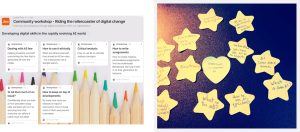This second blog about community activities at Digifest 2024 includes reflections from the workshops hosted by the building digital capabilities and digital experience insights teams.
Our community workshop at Digifest 2024, with its theme of ‘Imagine the future’ provided a great opportunity for members of the building digital capability and digital experience insights communities to come together in a relaxed session and share experiences as they address the challenges in supporting digital transformation. This half-hour session offered three themed discussion topics:
- The biggest challenges in your organisation – do these match with your insights data?
- Overcoming barriers to engagement – starting and sustaining engagement
- Developing digital skills in the rapidly evolving AI world
The biggest challenges in your organisation
 Participants who joined this theme comprised representatives from further and higher education as well as from the private sector. The issues discussed ranged from trying to transform work-based training from traditional paper-based approaches to digital, the capacity and capability of organisations to implement surveys and analyse survey findings and ensuring the analysis and findings reaches the right people and is put to work. Survey fatigue is also a common issue – as is negotiating to find a time free of other surveys to run the survey and ensuring this also aligns with budgetary planning cycles.
Participants who joined this theme comprised representatives from further and higher education as well as from the private sector. The issues discussed ranged from trying to transform work-based training from traditional paper-based approaches to digital, the capacity and capability of organisations to implement surveys and analyse survey findings and ensuring the analysis and findings reaches the right people and is put to work. Survey fatigue is also a common issue – as is negotiating to find a time free of other surveys to run the survey and ensuring this also aligns with budgetary planning cycles.
It was an interesting and varied discussion and a great opportunity to start to share potential solutions and listen to how others are addressing these issues.
Overcoming barriers to engagement – starting and sustaining engagement
In this theme we discussed barriers to embedding and implementing digital skills support within the further and higher education sectors. Similar themes seemed to come through naturally, staff turnover, tight budgets and for some institutions, lack of understanding of the relevance and importance of digital skills from senior leadership.
What was interesting is the shift from supporting students, to now supporting and empowering staff to develop their digital skills to then in turn support their students. It was felt that staff digital confidence has taken a rapid decline over the last two years due to workload and changing technologies such as artificial intelligence (AI).
Moving forward it was felt that more emphasis and incentives were needed for staff to develop their digital skills, not just in terms of time but also in by including the skills needed in the job specifications.
“As a service team it was helpful to be able to discuss the new question sets around AI and how this will support and give institutions the understanding of digital confidences in this area”.
Developing digital skills in the rapidly evolving AI world
AI and staff development
Colleagues with various roles joined us to discuss staff development against the background of opportunity and uncertainty of AI in education. The discussion was wide ranging and insightful. We captured some of the points on post-it notes and a Padlet board, summarised below.
AI offers much as an educational tool, a time-saver and a collaborative ally. There were synergies between our conversation and the excellent AI student panel at Digifest the following day. Both staff and students fear the impact on assessment; what role should it play, both in producing assessments and in marking them? How can we make it fair? Do we feel we are cheating, or being cheated?
Whist there can be a reluctance to encourage, even allow, students to use AI, the genie is out of the bottle: students are using AI for academic work and will need it in the world of work too.
Overcoming staff development challenges: time, fear, denial and digital divides
- Educators lack time to develop competencies to support students in AI use
- Institutions are grappling with issues of equity. paid versus free is a challenge for students and teachers alike
- Participants reported colleagues’ reluctance to use AI for teaching, reflecting a perceived challenges to teaching identity.
- Change can entail the five stages associated with grief. Some get stuck in denial – “don’t use it and don’t let students use it.” Some may need help accepting it is here to stay.
Do you want your weekends back?
To motivate reluctant colleagues, delegates suggest AI can help with mundane tasks. One participant asked colleagues whether they ‘wanted their weekends back?’ Another suggested AI can be ‘an additional team member.’
That said, we shouldn’t assume AI gives us ‘the answers’. Tools like ChatGPT best facilitate a dialogue with our ideas, provided we have the meta-level understanding of AI; how are language models trained; how should we prompt AI; how do we interpret the responses.
Echoing Michael Webb’s keynote,
“let’s agree to not use AI to mindlessly create content”.
The Jisc AI question sets help staff and students overcome fears, develop skills and use AI effectively.
Continue the conversation
And if you care to join us at our next joint building digital capability and digital experience insights online community event on 6 June 2024, you will be very welcome. The event is free to attend but registration is required. Register now to secure your place.
Both services also offer regular webinars for subscribers which are promoted via the Jisc events site.




